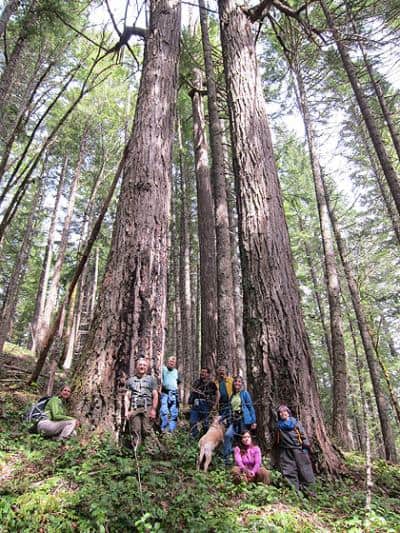
Previously, we’ve discussed and debated the Willamette National Forest’s proposed Goose timber sale, especially as it relates to the fact that many local residents in the McKenzie Bridge area of Oregon knew nothing of the Forest Service’s plans to log 7,600 logging trucks full of trees from what amounts to their neighborhood.
According to the Eugene Register Guard, a federal judge has put the McKenzie Bridge timber sale on hold, ordering the Forest Service to prepare an environmental impact statement. At the end of the article you’ll notice that this logging project would reduce 13% of the Lookout Mountain Potential Wilderness Area, in a part of central Oregon that’s already heavily logged and roaded. Besides, logging to reduce potential Wilderness is, like, so, late 70s/early 80s. Hey Forest Service, get with 21st Century already.
A federal judge has ruled that the U.S. Forest Service cannot go forward with a controversial logging project near McKenzie Bridge until an environmental impact statement has been prepared.
People living near the 2,100-acre Goose Project had opposed strongly the logging plans. They said there had been insufficient notice about the project and that they didn’t find out about it until it was too late for them to weigh in.
Cascadia Wildlands and Oregon Wild, represented by the Western Environmental Law Center, filed a lawsuit last May challenging the project.
In a ruling dated Thursday and made available late Tuesday, U.S. District Judge Ann Aiken said the timber sale could have a “potentially significant effect” on the environment. As a result, the Forest Service erred in choosing a less stringent environmental assessment, rather than a more demanding environmental impact statement, to assess the potential effects of harvesting an estimated 38 million board feet of lumber from federal land….
Aiken’s ruling will likely be embraced by McKenzie Bridge area residents who said they didn’t learn about the pending timber sale and harvest until last spring. Those residents had little recourse because they didn’t have legal standing to challenge the sale — unlike Cascadia Wildlands and Oregon Wild, who did have such standing because they were the only parties to have appealed the project back when it was approved in 2010.
Doug Heiken of Oregon Wild said Tuesday that the ruling is a victory for local residents who will now have a much greater opportunity to be heard on the matter. That’s because an environmental impact statement requires greater public participation. “The public gets to comment, so that the decision-maker has the benefit of that information and can make a fully informed decision,” Heiken said.
Heiken said the Forest Service “had the chance to get it right a couple of times and stumbled.” The agency could have limited the proposed sale to the noncontroversial thinning of dense young timber stands, but instead opted to include the proposed logging of mature forests and logging near riparian areas, he said.
The agency again made a misstep when it decided against inviting public comment after local residents learned of the proposed sale last year, he said. “The Forest Service still had the discretion to do that and avoid this lawsuit,” he said….
Aiken said that the project would reduce the 9,664-acre Lookout Mountain Potential Wilderness Area by 1,249 acres — resulting in the harvesting of 680 acres of timberland and fragmenting an additional 569 acres from the rest of the potential wilderness area. In addition to the number of acres logged, the project also would authorize the construction of eight miles of temporary roads and one mile of permanent road, the judge noted.
Here is the press release from the plaintiffs.